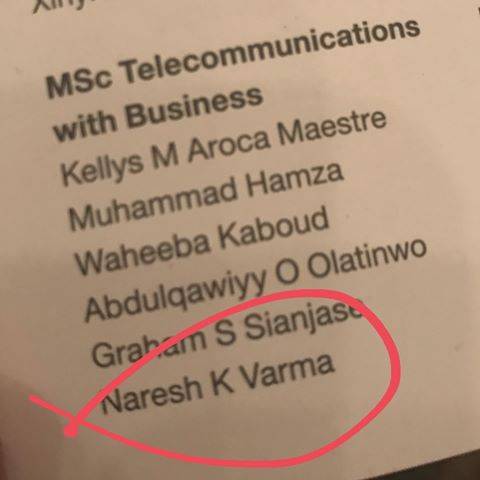沟通之前:希望您能花,三到五分钟的时间,观看我们的视频,对我们的能力,有一个初步判断。
堪萨斯大学毕业照展示

美国宇航局、休斯顿堪萨斯大学和赖斯堪萨斯大学将成为科学家、政策专家、石油和天然气工程师和州政府官员联盟的一部分,该联盟致力于预防未来的石油泄漏灾难。
在约翰逊航天中心展出的土星五号月球火箭下面,佩里宣布了海湾项目的成立,以使近海钻探更加安全,他称之为“德克萨斯州版本的传奇月球竞赛”。
佩里重申,他反对奥巴马政府暂停深水钻探,并称之为“基于普遍情绪而非合理科学的大量新规定”。
佩里说,海湾项目代表着“国家最高领导人前所未有的合作”。
科学家、工程师和研究人员集中于保护我们的居民、环境和经济的一系列至关重要的明确目标。
休斯敦纪事遗址完整报道

Greek universities fear the EU’s latest directive will open the floodgates to sub-standard foreign competition and devalue university degrees in the process by treating liberal study centres as equal to universities.
For British universities already offering programmes via the centres, there may be rich pickings.
Suddenly everyone is interested in Greek education.
Ambassadors, foreign ministers, heads of foreign universities, even the US Secretary of State for Education, have been coming and going at the Greek Education Ministry.
They have come to talk about the Greek liberal studies centres, those educational mongrels for so long on the periphery of the system that have now been catapulted into the news by European Union directive 36/2005.
The centres do not come under the jurisdiction of the Education Ministry.
They operate under licence from the Ministry of Development, formerly the Ministry of Trade, and claim to offer university-level education.
In fact, they offer no more than post-secondary education and charge very high fees.
They are linked to foreign universities, mainly British, which provide the programmes students follow either for two years in their own countries and another two years abroad, or all four years at home or abroad.
Degrees issued by these ‘colleges’ are not recognised by the Greek state.
Their graduates are not allowed to apply for positions in the public sector although there are no restrictions in the private sector.
But EU directive 36/2005 obliges Greece to make no distinction between the professional rights of students who have graduated from the centres and those from Greek universities.
The former feel it is only fair, the latter that their degrees are being undervalued.
Anger among lecturers has boiled over into a spate of one and two-day strikes.
There are already more than 25,000 graduates of the centres eagerly waiting to apply for positions in the public sector following the EU directive.
Some have already taken legal proceedings against the government and are pressing for recognition of their professional qualifications.
The 10,000 students at the centres are eager to find out what the future holds for them.
They and those who come after them are the reason why foreign representatives are crowding the Education Ministry’s corridors.
They want to know when Education Secretary Evripidis Stylianidis intends to embed the EU directive in Greek law, which will open the way for foreign universities to set up branches in Greece.
Undoubtedly, Britain, France and other major West European countries, as well as the US, are more interested in the far bigger emerging educational markets of China, India and Russia.
But the estimated €30 billion (US$42 billion) Greek market is not to be sneezed at.
Stylianidis, however, is not in a hurry.
He is committed to the government’s policy of recognising the centres as colleges but in the light of his predecessor’s experience – being dumped by voters in the last general election – he intends to tread very carefully.
He does not want to antagonise either the students or the academic community by rushing forward with legislation.
Strictly speaking, he is not obliged to comply with the EU directive and could claim, with some justification, that the colleges are not part of the country’s educational system, that they are merely commercial enterprises, and could refuse to recognise them or even close them down.
But with only a slim majority of two in the present parliament and struggling in the polls, the ruling conservatives need all the support they can get and there are plenty of those who look to the colleges to make money.
These include many graduates who would like to see their professional qualifications upgraded to a university degree and a lot of parents who do not wish to see the aspirations of their offspring unfulfilled.
So Stylianidis is waiting for the final decision of the European Court of Justice, not expected until spring, before he presents his own decision.
He is committed to recognising the centres but only under new and stricter legislation as well as clear guidelines; plus specifications regarding the academic programmes, building facilities, teaching staff qualifications and continuous assessment by internal and external examiners.
The colleges’ owners promise bigger investment and upgrading of their services after recognition.
They say they are able to withstand the most severe scrutiny, including the qualifications of their teaching staff and the quality of their educational programmes.
Full higher education status would add kudos and bring more clients to their business.
But regional university and technological institute presidents are worried that recognising the colleges will sound the death-knell of their institutions.
They have already lost more than 30,000 students following the previous Education Secretary’s decision to preclude students from courses with less than 50% of the top mark.
The presidents fear a large number of students will prefer to go to a revamped and upgraded private college, pay an annual fee of some €10,000 and live at home with their parents, rather than spend an equivalent amount in living expenses while attending a far-flung state higher education establishment.
Some of the regional state higher institutions are fighting back by forming alliances, upgrading their services, exchanging information, and sharing funds.
"Most of these colleges," said a regional university source, "do not provide anything other than post-secondary education and we feel they have a long way to go to achieve a higher education standard; so we concentrate on areas where we have a good record and on fields (such as medicine and cutting-edge sciences) where these ‘colleges’ are unlikely to become active.
"The government’s expressed policy is to attract foreign investment on the one hand and provide strong competition for the state universities on the other, without committing additional funds for education.
But state institutions fear that, instead of becoming more competitive, they will be starved of funds while private colleges flourish by providing fashionable courses and degrees, charging high fees and repatriating their profits.
The only satisfaction Greek students will have, they say, is that they will be graduating from Harvard or the London School of Economics without leaving these pleasant shores.
| 案例展示 |
|---|
.jpg) 康卡迪亚大学波特兰分校学生毕业-手持证书毕业照 |
.jpg) 昆士兰大学学生毕业-手持证书毕业照 |
.jpg) 香港中文大学学生毕业-手持证书毕业照 |
.jpg) 奥本大学学生毕业-手持证书毕业照 |
.jpg) 伊利诺伊大学厄巴纳-香槟分校学生毕业-手持证书毕业照 |
.jpg) 赫特福德大学学生毕业-手持证书毕业照 |
.jpg) 韩国鲜文大学学生毕业-手持证书毕业照 |
.jpg) 约翰霍普金斯大学学生毕业-手持证书毕业照 |
.jpg) 祥明大学学生毕业-手持证书毕业照 |
.jpg) 世宗大学学生毕业-手持证书毕业照 |
.jpg) 南澳大学学生毕业-手持证书毕业照 |
.jpg) 诺丁汉大学学生毕业-手持证书毕业照 |
.jpg) 香港大学学生毕业-手持证书毕业照 |
.jpg) 新南威尔士大学学生毕业-手持证书毕业照 |
.jpg) 堪萨斯大学学生毕业-手持证书毕业照 |
.jpg) 萨福克大学学生毕业-手持证书毕业照 |
.jpg) 韩国汉阳大学学生毕业-手持证书毕业照 |
.jpg) 澳洲格里菲斯大学学生毕业-手持证书毕业照 |
.jpg) 安柏瑞德航空大学学生毕业-手持证书毕业照 |
.jpg) 格林威治大学学生毕业-手持证书毕业照 |
.jpg) 新西兰梅西大学学生毕业-手持证书毕业照 |
.jpg) 哥伦比亚大学学生毕业-手持证书毕业照 |
.jpg) 伦敦艺术大学学生毕业-手持证书毕业照 |
.jpg) 卡内基梅隆大学学生毕业-手持证书毕业照 |
.png) 埃迪斯科文大学学生毕业-手持证书毕业照 |
.jpg) 斯威本科技大学学生毕业-手持证书毕业照 |
.jpg) 索尔福德大学学生毕业-手持证书毕业照 |
.png) 韩国外国语大学学生毕业-手持证书毕业照 |
.jpeg) 瑞尔森大学学生毕业-手持证书毕业照 |
.jpg) 加州大学伯克利分校学生毕业-手持证书毕业照 |
.jpg) 加拿大皇后大学学生毕业-手持证书毕业照 |
.jpg) 韩国鲜文大学学生毕业-手持证书毕业照 |
.jpg) 麦吉尔大学学生毕业-手持证书毕业照 |
.jpg) 下莱茵应用技术大学学生毕业-手持证书毕业照 |
.jpg) 韩国翰林大学学生毕业-手持证书毕业照 |
.jpg) 京都大学学生毕业-手持证书毕业照 |
.jpg) 静冈大学学生毕业-手持证书毕业照 |
.jpg) 华盛顿大学学生毕业-手持证书毕业照 |
.jpg) 班戈大学学生毕业-手持证书毕业照 |
.jpg) 新加坡国立大学学生毕业-手持证书毕业照 |
.jpg) 南加州大学学生毕业-手持证书毕业照 |
.jpg) 华威大学学生毕业-手持证书毕业照 |
.jpg) 日本创价大学学生毕业-手持证书毕业照 |
.jpg) 多伦多大学学生毕业-手持证书毕业照 |
,Spain)-diploma (5).jpg) 国家医科大学骨科博士D.O.)西班牙)学生毕业-手持证书毕业照 |
.jpg) 曼彻斯特大学学生毕业-手持证书毕业照 |
.jpg) 韩国汉阳大学学生毕业-手持证书毕业照 |
.jpg) 加拿大温莎大学学生毕业-手持证书毕业照 |
.jpg) 伯明翰城市大学学生毕业-手持证书毕业照 |
.jpg) 伦敦玛丽女王大学学生毕业-手持证书毕业照 |
